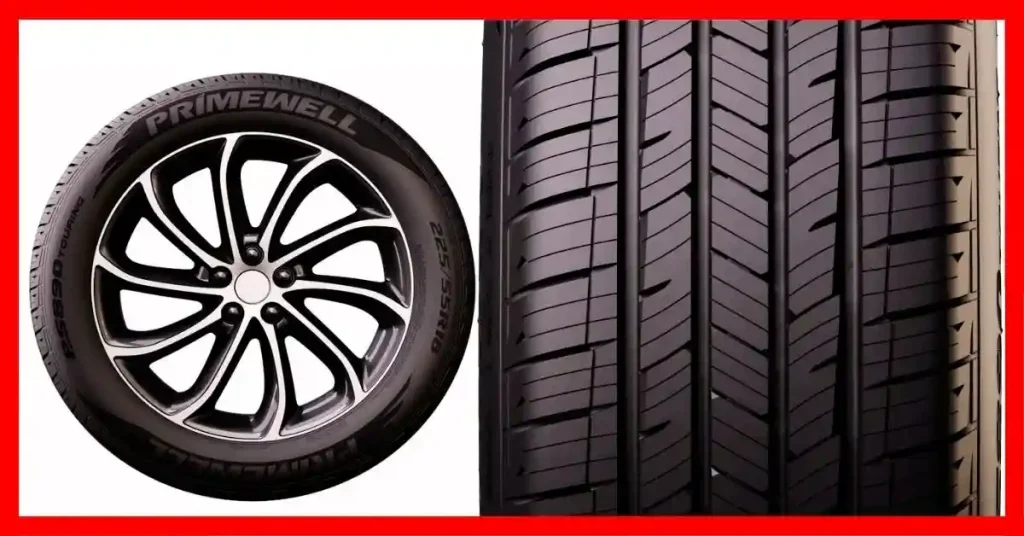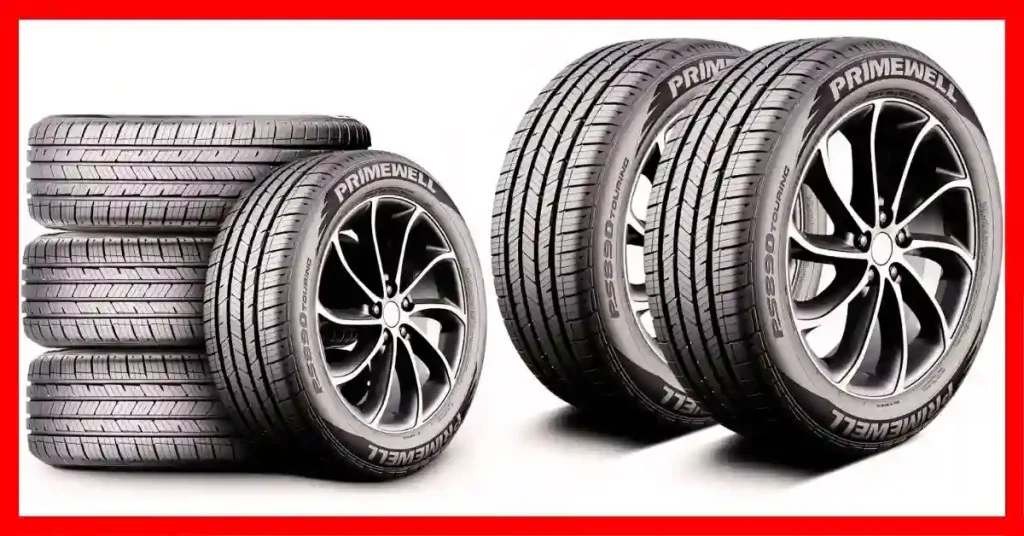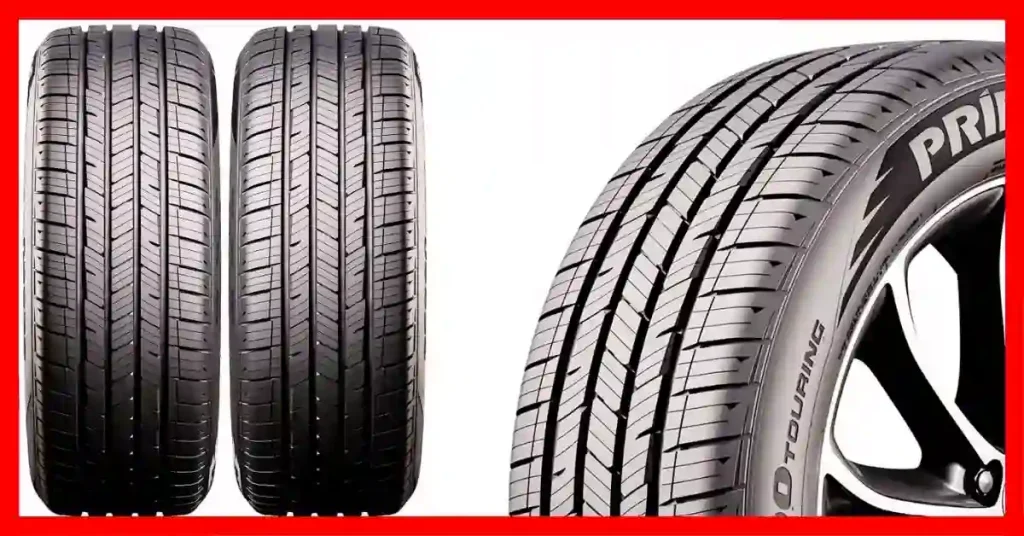Looking for new tires but don’t want to spend a fortune? I’ve been there. When my car needed a fresh set, I came across Primewell. I wasn’t sure what to expect. Are Primewell tires any good? I gave them a shot—and after driving on them every day, I’ve got real answers. In this Primewell Tires review, I’ll share how they perform, how long they last, and if they’re worth it for drivers like you.
Who Makes Primewell Tires? A Quick Background Check
Primewell tires are made by Giti Tire, a large company based in Singapore. I found this out when I was hunting for a good deal on tires. At first, I didn’t know the brand. But after a little digging, I saw they’ve been in the tire game for years.
Giti sells tires in over 130 countries, including the United States. They’re not a small shop. In fact, Giti built a big factory in South Carolina in 2017. That means some Primewell tires are made right here in the U.S..
You’ll often find them at Firestone and Bridgestone service centers. That gave me some peace of mind. If a big name like Bridgestone carries them, they must meet certain safety and quality checks.
So, who are Primewell tires made by? They’re made by Giti Tire, a trusted brand with a growing presence in the U.S. They may not be a top-tier name, but they’re not off-brand either. For daily drivers on a budget, they can be a smart pick.
🚗 Real-World Testing: How Primewell Tires Perform on the Road
🌤️ Dry and Everyday Driving Performance
If you drive to work, run errands, or take short trips, Primewell tires work well. I used the Primewell PS890 Touring on my car. For the price, I was happy with how they felt on the road.
Grip on dry roads was steady. Steering felt normal. Not too loose. Not too sharp. I wouldn’t race with them, but for daily drives, they felt safe.
✅ Primewell tires are a good fit for city streets, light traffic, and highway cruising. They’re not fancy, but they get the job done.
🌧️ Wet Weather and Light Snow Performance
In the rain, these tires are okay. I didn’t slide or spin, even in a heavy shower. I drove slower just to be safe. At normal speeds, they had decent grip and didn’t hydroplane much.
Braking took a bit more time on wet roads. Still, I never felt out of control. I kept more space between cars just in case.
In light snow, they were just okay. I had to go slow and take care. Stopping was harder, and they slipped a little when I took off from a stop.
✅ For rain and light snow, Primewell tires are fine if you drive safe. They’re not made for ice or deep snow, so be careful.

👉🏿👉🏻 Check Latest Price and Offer at Amazon 👈🏻👈🏿
❄️ Primewell Tires in Winter: What to Expect
Let’s be honest—these are not snow tires. I drove them in one early snowstorm. They worked, but just barely. I could feel them slip when I turned or stopped.
They’re okay if you get snow once or twice a year. But if you live where it snows a lot, you need better tires. Winter tires will grip better and stop faster.
✅ Primewell tires can handle light snow. But for icy roads or steep hills, get real winter tires.
Bottom line?
Primewell tires are best for dry roads and warm weather. They do okay in rain. Light snow is fine if you drive slow. But they’re not built for rough winters or fast driving.
📏 Durability & Tread Life: How Long Do Primewell Tires Last?
If you’re like me, you want tires that last without draining your wallet. So how long do Primewell tires last? On average, they go for about 40,000 to 50,000 miles. That’s around 3 to 4 years if you drive normally—say, 12,000 miles a year.
That number comes from both my own use and what I’ve seen online. I used a set of Primewell PS890 Touring tires for nearly 3 years. By the time I replaced them, they still had some life left, though they were wearing more on the edges. I rotate my tires every 5,000 to 6,000 miles, and that really helped stretch their life. So yes, with basic care, Primewell tires can last a decent while.
Compared to big names like Michelin or Goodyear, Primewell tires do wear faster. Premium brands often push 60,000 to 80,000 miles. But remember—those tires cost double. So while Primewell tires don’t last as long, they’re still a good deal for the price.
To keep your Primewells going strong, rotation is key. I also check tire pressure once a month. Low pressure wears them out faster and can mess with gas mileage. A quick check with a cheap tire gauge saved me a lot of trouble.
As for wear patterns, mine wore pretty evenly, except for the front pair. That’s normal for front-wheel-drive cars. If you notice bald spots or feathering, it might mean you need an alignment or your suspension needs a check.
✅ So, how long do Primewell tires last? With proper care, you can expect around 40,000 to 50,000 miles, which is solid for a budget tire. Rotate them often, keep them aired up, and they’ll treat you well.
🔇 Comfort and Noise: Are They a Quiet Ride?
Yes—Primewell tires are pretty quiet, especially in city driving. I’ve used them for everyday errands and highway trips. At low speeds, they’re smooth. I didn’t notice much road noise unless I hit rough pavement.
At 60 miles per hour, they still stayed calm. I didn’t have to turn up my music to block the tire sound. That was a nice surprise. I’ve used louder tires before, so this felt like a step up.
The ride itself? It’s comfy, but not super soft. You’ll feel a bump now and then. But for the price, it’s a solid middle ground. Not stiff like a sport tire. Not floaty like a luxury one. It’s just right for daily drives.
Compared to top brands like Michelin or Goodyear, yes—there’s a gap. Those brands feel smoother and quieter, even at higher speeds. But they also cost a lot more.
So, here’s the deal:
Primewell tires are quiet enough for most people. They’re great for commutes, errands, and casual trips. If you don’t need a silent ride, they’ll do just fine. I’ve driven them on city streets and highways, and they’ve held up well.
💰 Are Primewell Tires Worth It? Price vs Value
Yes—Primewell tires are worth it if you’re on a tight budget and just need something reliable. I got mine for around $65 each, and that included mounting. Compare that to a set of Michelins, which can run $120 or more per tire. That’s a huge difference, especially if you’re replacing all four.
When I first looked at Primewell, I wasn’t expecting much. But after a few months of city driving and weekend highway trips, they held up better than I thought. You won’t get high-end features, but you will get a solid, no-drama tire that gets the job done.
For basic commuting or a second car, they’re perfect. I put a set on my old Honda, which I mostly use for errands and grocery runs. The tires were smooth and steady, even on rainy days. I didn’t hear a ton of road noise either, which was a nice bonus.
Now, if you’re someone who drives hard, does long road trips, or lives where it snows a lot—these might not be your best bet. Premium tires give you better grip, longer tread life, and peace of mind in extreme weather. But they also come with a price tag that can double or triple what you’ll pay for Primewell.
So here’s the bottom line:
Primewell tires are best for drivers who want safe, simple tires without spending a fortune. They’re great for city drivers, folks with short commutes, or anyone who doesn’t push their car too hard. If that sounds like you, they’re a smart buy.

👉🏿👉🏻 Check Latest Price and Offer at Amazon 👈🏻👈🏿
👍 Pros and 👎 Cons of Primewell Tires: My Honest Take
When I bought Primewell tires, I didn’t expect much. I just needed something safe and cheap for my daily drive. But after a few months, I was surprised. They held up better than I thought.
✅ Pros:
✔️ Very affordable.
If you’re on a budget, these are a great pick. I paid about half of what I would have for a big-name brand. For daily use, they do the job just fine.
✔️ Good grip on dry roads.
I didn’t feel any slipping or sliding. Braking was smooth, even in stop-and-go traffic. They handled corners well too, as long as I didn’t push too hard.
✔️ Comfortable ride.
They feel soft on city streets. On the highway, they stay pretty quiet. I didn’t notice much road noise unless I was going fast.
❌ Cons:
⚠️ Shorter tread life.
After 30,000 miles, I saw signs of wear. I rotated them often, but they still didn’t last as long as I hoped. Many premium tires can go much longer.
⚠️ Not great in snow.
They were fine in light snow, but not in ice or deep slush. I wouldn’t use them for winter unless you live somewhere mild. For snow, real winter tires are a better bet.
⚠️ Few sporty options.
If you want speed or tight handling, these aren’t for you. They’re made for daily use, not racing or sharp turns. I wouldn’t put them on a sports car.
In short: Primewell tires are great for city driving and short trips. They save money and feel smooth on dry roads. But they wear faster and don’t like cold weather. I’d use them again—but only for the right car and the right job.
🆚 Primewell Tires vs Premium Brands: What I Found Out
I’ve driven on both Primewell and premium tires. If you’re stuck between saving money or getting top-tier performance, here’s what you should know.
| Feature | Primewell | Premium Brands (Michelin, Goodyear) |
| Price | $50–$80 | $100+ |
| Tread Life | ~40,000–50,000 mi | ~60,000–80,000 mi |
| Noise | Quiet at low speeds | Quiet across all speeds |
| Snow Use | Light only | Great with right model |
| Best For | City driving | Long trips and snow use |
Primewell is a great choice if you’re on a budget. I got four for the cost of two high-end tires. For short drives and errands, they get the job done.
But they don’t last as long. Mine wore out at around 40,000 miles. I rotated them and kept the pressure right. Still, my old Michelins lasted nearly twice as long.
Noise is fine at slow speeds. But on long trips, I noticed a hum. The premium tires were quieter, even at 70 mph.
In the snow, Primewell tires are just okay. They handled light snow, but I didn’t feel safe in ice or deep slush. My Goodyears gave me more grip and control.
So, who should buy Primewells? If you drive in town, don’t face rough weather, and want to save cash—they’re worth it. But for long drives, snow, or high mileage, go premium.
💬 My Final Verdict: Are Primewell Tires Any Good?
Yes, they are—if you know what you’re getting. I’ve used Primewell tires for daily driving. They’ve been fine for short trips, city errands, and highway rides. They’re not perfect, but they’re safe, quiet, and budget-friendly.
If you’re asking, “Are Primewell tires good for normal driving?”—my answer is yes. I’ve driven them in dry weather, in the rain, and even during light snow. They held up well for what I needed. They won’t impress a car expert, but for most of us? They’re enough.
That said, don’t expect premium quality. These aren’t built for speed, racing, or deep snow. The tread won’t last forever. But if you rotate them and take care of them, you’ll get solid value.
👍 Great for:
- People who drive around town
- Drivers on a tight budget
- Second cars or older cars
- Places with mild weather
❌ Not great for:
- Snowy or icy roads
- High-speed or sports driving
- People who drive a lot each year
Bottom line? Primewell tires are a smart pick for the right person. They’re not fancy, but they work. For me, they’ve done the job—and that’s what matters.

👉🏿👉🏻 Check Latest Price and Offer at Amazon 👈🏻👈🏿
❓FAQs About Primewell Tires
Q1: Are Primewell tires any good?
Yes, they are—if you’re looking for basic tires that get the job done. I’ve used them on my daily commute and quick weekend trips. They’ve held up just fine for normal driving. Don’t expect them to feel like Michelin or Goodyear, but if you’re just trying to get from point A to point B safely, they’re a solid pick.
Q2: Who makes Primewell tires?
Primewell tires are made by Giti Tire, a global brand based in Singapore. Giti has been around for decades and even has a plant in South Carolina. So yes, some Primewell tires are made in the U.S. The company supplies tires to stores like Firestone and is pretty well known in the budget tire market.
Q3: How long do Primewell tires last?
On average, Primewell tires last about 40,000 to 50,000 miles. That’s been my personal experience too. I got a little over 45,000 miles before the tread started to fade. If you rotate them and check your air pressure often, they’ll last longer. But they probably won’t outlast premium brands that go 60,000+ miles.
Q4: Do Primewell tires perform well in snow?
They’re okay in light snow, but I wouldn’t trust them in a blizzard. I drove with them during a couple of cold, slushy days and made it home just fine—but they don’t have the grip of real winter tires. If you live where snow piles up, it’s safer to get a set of snow tires for the season.
Q5: Where can I read more Primewell tire reviews?
You’ll find reviews on TireRack, Discount Tire, and Walmart’s site. But honestly, I trust real-world stories more than star ratings. That’s why I wrote this review—to share what it’s actually like to live with these tires. They’re not flashy, but they’ve been dependable for everyday use.
📌 Key Takeaways
Primewell tires are a good fit if you’re on a budget. They work well for daily driving in dry or wet weather. I’ve used them for city trips, quick errands, and weekend drives. They felt stable and smooth enough for everyday use.
But they’re not great for heavy snow or icy roads. If you live where winters are rough, you’ll need true snow tires. These don’t offer the same grip or safety in deep cold.
They also wear out faster than top brands. I noticed the tread didn’t last as long as it did with my older Goodyears. Still, they held up fine with regular care and tire rotation.If you want tires that are cheap and reliable, Primewell is a smart pick. They’re great for second cars or if you don’t drive a lot. I’d skip them for sports cars or long, icy trips—but for everyday stuff, they do the job.
To Get More About Car Accessories Product You Can Visit Our Site. If You Found our Posts Helpful Leave a Comment Below

